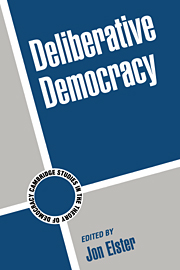Book contents
- Frontmatter
- Contents
- List of Contributors
- Preface and Acknowledgment
- Introduction
- 1 “Claro!”: An Essay on Discursive Machismo
- 2 Deliberation as Discussion
- 3 All Men Are Liars: Is Democracy Meaningless?
- 4 Deliberation and Constitution Making
- 5 Pathologies of Deliberation
- 6 Deliberation and Ideological Domination
- 7 Arguing for Deliberation: Some Skeptical Considerations
- 8 Democracy and Liberty
- 9 Health-Health Trade-offs
- 10 Full Representation, Deliberation, and Impartiality
- Index
9 - Health-Health Trade-offs
Published online by Cambridge University Press: 05 June 2012
- Frontmatter
- Contents
- List of Contributors
- Preface and Acknowledgment
- Introduction
- 1 “Claro!”: An Essay on Discursive Machismo
- 2 Deliberation as Discussion
- 3 All Men Are Liars: Is Democracy Meaningless?
- 4 Deliberation and Constitution Making
- 5 Pathologies of Deliberation
- 6 Deliberation and Ideological Domination
- 7 Arguing for Deliberation: Some Skeptical Considerations
- 8 Democracy and Liberty
- 9 Health-Health Trade-offs
- 10 Full Representation, Deliberation, and Impartiality
- Index
Summary
The Problem
U.S. constitutional government aspires to be deliberative as well as democratic. Government decisions are supposed to be responsive to public will; but public institutions are also designed to ensure an exchange of information, a degree of reflection, and exposure to diverse views. It is for this reason that the aspiration to achieve deliberative democracy is a defining feature of U.S. constitutionalism.
In the past decade, much of the discussion of deliberative democracy has been highly abstract. That discussion has dealt primarily with competing conceptions of political autonomy, the nature of deliberation, the vices and limits of interest-group pluralism, the best conception of majority rule, and the kinds of reasons that are appropriately invoked in the public domain. My purpose in this essay is both more practical and more mundane. I hope to describe a set of serious failures in democratic deliberation – in the particular area of environmental risk – and to connect those failures with current institutional practices and potential institutional solutions. In the process it will be necessary to say something about individual and social rationality, and about the relationships among choices, preferences, and considered judgments. These claims will connect, I believe, with some of the more abstract issues raised by proponents of deliberative democracy.
Sometimes Americans seem obsessed with risks. The discovery of a new danger – in the air, in food, in the workplace, in consumer products – can provoke extensive media attention, produce congressional hearings, and even spur enactment of new legislation.
- Type
- Chapter
- Information
- Deliberative Democracy , pp. 232 - 259Publisher: Cambridge University PressPrint publication year: 1998
- 6
- Cited by



